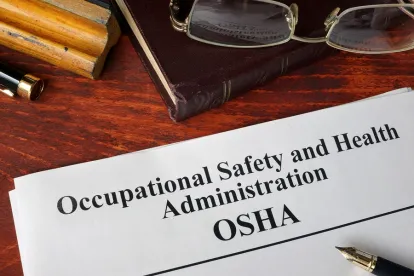It is an unfortunate outcome of this pandemic that in the OSHA world, guidance lags behind enforcement. While state and federal agencies try to make up their minds on the best way of managing COVID-19 threats in the workplace, many employers who have to remain open are receiving citations and penalties for, essentially, making educated but incorrect guesses on what to do. Even the CDC guidance has flip-flopped so often, employers are forced to write preventative plans and procedures in pencil so that they can be easily erased and re-written to conform on a moment’s notice. Take, for example, the decision of whether to report an employee’s hospitalization or death due to COVID-19 to OSHA:
Federal OSHA
Under 29 C.F.R. § 1904.39, all employers – including low-risk employers that are partially exempt from certain OSHA recordkeeping requirements – must contact OSHA to report some serious work-related injuries and illnesses, such as fatalities and in-patient hospitalizations. These reporting requirements, which are dependent on employer knowledge, are also tied to specific timing considerations and constraints. 29 C.F.R. § 1904.39 (b)(6) in particular conveys that employers have 8 hours to report a work-related fatality that occurs within 30 days of the work-related incident (i.e., event or exposure) precipitating it. Employers likewise have 24 hours to report an in-patient hospitalization if the hospitalization occurs within 24 hours of the work-related incident that caused it.
Most infectious diseases are not recordable or reportable under OSHA regulations for many reasons. First and foremost, because of the prevalence of common infectious diseases in the general population, it is impossible to determine whether an infection is work-related or not. Second, rulemaking initiatives surrounding the regulations noted explicitly that there should be a carve out for the common cold, flu, and similar illnesses because these illnesses were public health matters rather than occupational exposure issues, and as such were not work-related. OSHA has further generally excluded illnesses from the recordkeeping requirements that can develop regardless of workplace exposure. However, OSHA decided on April 13 that COVID-19 illness would be treated as a recordable or reportable illness in some cases.
COVID-19 is a highly infectious disease that is easily spread through aerosolized respiratory droplets (e.g., sneezes, coughs, etc.) while individuals are in close contact (i.e., less than 6 ft. distance). To make matters more complicated, COVID-19 can also be spread by asymptomatic individuals. As COVID-19 community spread has increased, employers have had to grapple with determining work-relatedness with limited and, in some cases, changing guidance from authorities. As discussed in some of our earlier blog posts, early on in the pandemic OSHA initially advised that only those employers with occupational exposures to COVID-19 (e.g., healthcare facilities) were required to assess COVID-19 cases for work-relatedness. But the agency changed course on this position in May, stating that all employers needed to assess COVID-19 cases for work-relatedness. Then in mid-July, OSHA quietly updated its COVID-19 FAQs to add guidance that took an extremely broad (and probably unenforceable) interpretation of an employer’s responsibility to report COVID-19 hospitalizations and fatalities. That approach, which was deleted from the site just a couple of weeks later, required employers to report COVID-19 hospitalizations and deaths regardless of work-relatedness or timeline between the potential workplace exposure (i.e., last day worked) and reportable event. Such an approach would have required reporting on COVID-19 cases that did not occur during the regulatory limitations period for reporting – a complete departure from the regulation.
On October 1, 2020, OSHA updated the FAQs again – this time taking a more reasonable approach. In these latest FAQs, OSHA defines a “work-related incident” as “an exposure to SARS-CoV-2 in the workplace.” This is a significant and welcomed departure from OSHA’s previous position, which eliminated the work-relatedness determination altogether. OSHA’s FAQs are merely guidance, and not even formal guidance. OSHA does not review and approve FAQs posted on its website with the same rigor as a memo, interpretation letter, or other document – and of course, OSHA’s decision not to engage in rulemaking on COVID-19 means that none of its COVID-19guidance has been subject to notice and comment or other rulemaking requirements under the Administrative Procedures Act. However, the absence of a formal rule means that the agency’s COVID-19 guidance memorandums and FAQs are employers’ best resource to understand how federal OSHA views these issues and the position OSHA will take on them in an enforcement action. However, employers cannot stop there – because various states have their own reporting requirements that sometimes diverge widely from the federal agency.
State Considerations
There are 28 OSHA-approved State Plans that operate statewide occupational safety and health programs. Of these State Plan states, several states, including specifically California, New Mexico, and Virginia have taken varying positions on COVID-19 case management, resulting in distinct reporting requirements. A table comparing these states’COVID-19 case reporting requirements is provided below:
| Federal OSHA | California Reporting Distinctions | New Mexico Reporting Distinctions | Virginia Reporting Distinctions | |
| “Reportable” COVID-19 Case Requirements | Confirmed COVID-19 positive case through testing that is determined to be work-related and results in satisfaction of reporting criteria. |
|
|
|
In addition to these reporting requirements, employers must also juggle reporting obligations to state and local health departments, notification requirements to employees and other third parties, and coordination with federal and state government agencies on COVID-19 concerns. In application, this means that for any given COVID-19 case, an employer may have a reporting obligation to (i) federal OSHA, or the state equivalent, (ii) state or local public health department, and corresponding notification obligations to (iii) employees and (iv) applicable third parties – all within strict timelines. Constantly evolving and, at times, inconsistent guidance from federal OSHA, government agencies, and state agencies ultimately leaves employers with significant uncertainty and confusion, as well as less opportunities to be successful in hitting their compliance targets.
To avoid regulatory liability and minimize risks of enforcement, employers need to be diligent in managing COVID-19 cases, even if they are likely from community exposures, and maintain effective records. Having a written plan for management of a COVID-19 case ahead of time, which is regularly updated, to account for changes in reporting and notification requirements can also help ensure reporting is done consistently, in a timely manner, and in accordance with the various reporting requirements.




 />i
/>i

